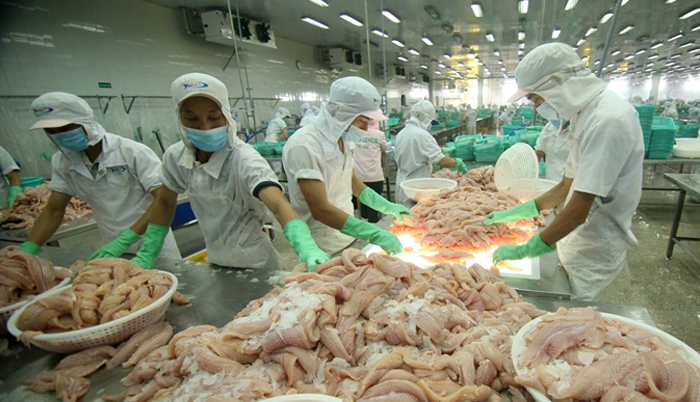![]() Home > Vietnam
Home > Vietnam
Australia’s Seafood Import Rules Tightened

Tra fish being processed for export at Phát Tiến Seafood Company in southern Đồng Tháp Province. Local seafood enterprises were urged to comply with Australia’s regulations for exporting seafood products to remain in the market. | Photo: Vũ Sinh
![]() July 23rd, 2016 | 08:38 AM |
July 23rd, 2016 | 08:38 AM | ![]() 1107 views
1107 views
HÀ NỘI
Local seafood enterprises must comply with Australia’s regulations for export seafood products to remain exports to the market, according to the National Agro, Forestry and Fisheries Quality Assurance Department (NAFIQAD).
The department said Food Standards Australia New Zealand (FSANZ) had sent an announcement to the department about the inspection of seafood products imported to Australia.
Australia’s regulations strictly adhere to international rules, NAFIQAD director Nguyễn Như Tiệp told Việt Nam News.
“Therefore, local enterprises must comply with those regulations if they keep exporting food to Australia,” he said. “The department has updated those regulations for local enterprises.”
FSANZ has categorised food imported to Australia, including groups of high-risk products and monitoring products, and announced regulations for checking each group.
The group of high-risk foods includes boiled crustaceans/shrimp, mackerel/tuna, processed and instant fish, and mixed seafood.
High-risk foods are referred to the department by the Department of Immigration and Border Protection. These foods are initially inspected and tested at a rate of 100 per cent of consignments, according to Australia’s Department of Agriculture and Water Resources’ website.
Once five consecutive consignments have passed inspection, the inspection rate may be reduced to 25 per cent; after a further 20 consecutive passes, the inspection rate may be reduced to 5 per cent.
Food under surveillance includes fish; fresh, frozen, dried and salted fish paste; sardines; salmon and fish sauces.
All other foods are considered to pose a low risk to human health and safety and are classified as ‘surveillance food’. Each consignment of surveillance food has a 5 per cent chance of being referred for inspection to assess its compliance with Australian food standards.
As surveillance foods are considered to be low risk, they are subject to a ‘test and release’ direction and can be distributed for sale before test results have been received.
Any consignment of high-risk and surveillance foods that fails forces a return to 100 per cent testing of that product until a history of compliance is re-established for the producer of the food.
The export value of Việt Nam’s seafood products to Australia increased sharply from US$15 million in 2011 to $225 million in 2014, but reduced to $117 million in 2015, according to the Ministry of Industry and Trade’s.
Source:
courtesy of VIET NAM NEWS
by Viet Nam News
If you have any stories or news that you would like to share with the global online community, please feel free to share it with us by contacting us directly at [email protected]